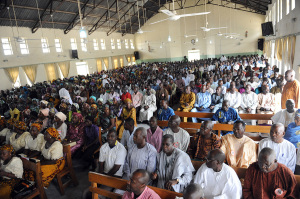How do we endure through trials?

In conversation, we tend to use the words endurance and perseverance almost interchangeably. But in practice, there’s a notable nuance between enduring and persevering — one that can make a huge difference in how we approach life’s challenges.
Christian psychologist Dr. Curt Thompson reveals a subtle yet very important distinction between endurance and perseverance in his latest book, The Deepest Place. He says, “Endurance tends to suggest durability or sustainability in the face of hardship and the resilience inherent in that process. Perseverance implies a somewhat more active posture in response to the hardship.” In short, “to persevere requires very hard work” (pgs. 103-104).
Both endurance and perseverance are virtuous qualities, to be sure. In fact, as we’ll see below, both are found in Scripture (sometimes interchangeably, among different translations). But when thinking through the quote above, it seems fair to say that perseverance requires a different approach than endurance. Let’s explore what it might mean to endure and persevere within the different facets of our lives.
Physical endurance vs. perseverance
At the risk of oversimplification, the difference between enduring and persevering might be described through gym-wall posters: “Keep on keeping on” versus “putting in the work.” Both catch phrases could be helpful motivators in the face of a physical challenge, but they have different implications.
Perhaps the idea of “keep on keeping on” could be compared to running a marathon. One foot in front of the other, enduring the rigors of the race. But in order to do that, the athlete would need to “put in the work” of training upfront in order to be ready. They’d need to persevere through progressively more difficult workouts. This could become a metaphor of sorts to help understand endurance and perseverance in other areas.
Mental endurance vs. perseverance
In The Deepest Place, Dr. Thompson explores the reality of suffering and its effect on our mind (among other things). Of course, if we go through a traumatic event, it will require mental endurance just to process what happened. But Dr. Thompson suggests that perseverance is also necessary when facing such a challenge.
“Perseverance … implies practice — continual, repeated practice over long periods of time — that harnesses the principles of neuroplastic change the creation and growth of new neural pathways. By attuning our attention to particular things … we SNAG the brain — Stimulate Neuronal Activation and Growth” (pg. 127).
Thus, in his practice, he helps clients learn new ways of mentally responding to their particular challenges. If their natural response to a certain trigger is unhealthy, he suggests a new way. Over time, as the client continues to practice this new, healthier response, they create new neural pathways that become natural in the face of the trigger. This is mental perseverance in action.
Emotional endurance vs. perseverance
Most of us have endured some type of emotional pain or challenge that we’ve had to endure. Grief comes to mind first — in this fallen world, none of us are immune to grief’s agony. Whatever the cause for grief, it requires emotional resilience to simply endure the process.
Dr. Thompson says that perseverance is also required, though, specifically in the form of practicing lament. He cites the work of psychologist Liz Hall, who points to an intentional lament cycle of complaint, petition, and praise — all very hard work in the space of grief.
“This practice of lament allows us to sense God acknowledging our deepest places of alienation, deepest places of loss, deepest pain — and so come to experience God’s love as even deeper than we could expect … Inherent in the lament of perseverance is our commitment to be willing to repeatedly enter a cycle of grief” (pg. 123).
Spiritual endurance vs. perseverance
God is clear throughout his Word that we can expect challenges. And when those trials inevitably come, He calls us to both endure and persevere through them.
In the face of impending persecution, the writer of Hebrews encourages believers to effectively “keep on keeping on” in their faith. “Therefore, do not throw away your confidence, which has a great reward. For you have need of endurance, so that when you have done the will of God, you may receive what was promised.”
Enduring — being resilient and faithful and patient — through trials is tough enough. But in light of the nuance we’ve noted above, consider the slight word shift in Romans 5:3-4: “… We also glory in our sufferings, because we know that suffering produces perseverance; perseverance, character; and character, hope.” Is Paul really telling believers to “put in the work” while they’re suffering?
Dr. Thompson suggests gently that the answer is yes. He acknowledges the reality all around us, that not all suffering inevitably produces hope. For some suffering produces the opposite: hopelessness. So, in order to get to that place of hope, perseverance — the hard work of taking active steps of faith in the middle of challenges — is essential.
Consider the whole sequence. Dr. Thomson notes that when practicing perseverance, “… I do not merely ‘feel better.’ No — I am changed. And the more I practice this, the more permanent the change becomes, permanent change that becomes, in essence my character” (pgs. 124-125).
Just as mental perseverance literally rewires neural pathways, spiritual perseverance literally changes who we are, our character. (In fact, the two are interconnected.) That new character is one that sees clearly the direct connection between our trials and our hope: A continual changing to be more and more like Jesus. After all, our hope is built on nothing less.
Conclusion
In what areas do you have need of endurance? In what areas might the Lord be calling you into the hard work of perseverance? For more on “suffering and the formation of hope,” I highly recommend Dr. Thompson’s book The Deepest Place.
Melissa Richeson is a freelance writer and editor based in Central Florida. Her work has been featured in places like The Washington Post, Florida Today, Sunlight Press, BiggerPockets Wealth Magazine, WDW Magazine, and many other outlets. As a Medi-Share member, she shares regularly about her positive Christian Care Ministry experience over the past decade. Melissa can often be found in real life at the beach, or virtually on her freelance website.



























